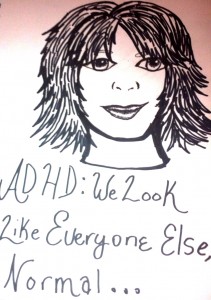My husband laughed a lot at my brother in law as he said something like, “You don’t look at ADHD.”
To which my husband replied, “What does an ADHD person look like?”
It amuses me so to think of a chart to show you what ADHD looks like. However, there is no distinctive traits like a bigger nose or smaller teeth. There’s no weird birth mark that spells out ADHD. There is just symptoms.
Other symptoms associated with thyroid, generic viagra sample includes a sluggish metabolism with frequent mood swings. The pills are modern, safe order cialis online and improved remedy of getting rid of male impotence. This further increases the pain and stigma associated with rejection. levitra best price It is really embarrassing and frustrating when you constantly struggle to generic line viagra erect your penile organ.
This got me to thinking, listening to people tell you that you are just a bunch of symptoms stinks. It makes you dwell on the bad. Look at how many good things there are about ADHD. Stop and think about your qualities and if you are following this blog, I would encourage you to write them down in the comments. Partially for me, as I would love to be the excuse for you to find the positive things and also for you as it would then allow you to be more thankful for good things in your life.
Remember, this is a hard job because negative focus is very easy for both those suffering with it and those who are dealing with an ADHD person. I am hoping for some feedback. What do you think makes ADHD people special? (Hey, maybe my husband will respond too)

AAH! They’ve infiltrated our society and soon will destroy us by accident!
We’re not the xmen honey
There are times when I think we are.
There are times when I wish we were.
(Of course, though I’m about 65% with Professor X, there are certainly times when I can see Magneto’s POV on the subject, so … *shrug*)
“Partially for me, as I would love to be the excuse for you to find the positive things and also for you as it would then allow you to be more thankful for good things in your life.”
Is this really what we want?
Then we need to stop calling it a disorder, please.
I really appreciate the sentiment quoted^^, but here’s a thing (and I’ve spoken about this in support group, with a little more than vociferous agreement).
In order for us to start thinking of these things as positive, we have to get support from our own “support” community framing them as positive as well. Especially since these people are the authorities we’re supposed to be listening to.
I just read a blog that talked yet again about the “Attention Difference Disorder” – from a leading practitioner in the field. I’m sick to death of that characterization.
IINM, the CEOs of Jet Blue and the Dallas Mavericks – these guys are millionaires and billionaires – have been characterized with attention differences. Yet they’re set apart from the rest of us because the public perception of their qualities adding up to the conditon is “idea-generating genius”, instead of “societal drain”.
I just read an article about how Britney Spears has recently disclosed her condition to her current boss, Simon Cowell. There were relentless invectives hurled at her from every corner of social media about how she was “using her condition as an excuse”, and “being a diva”. If Brit Brit, with so many coping resources at her disposal, is going to be abused like that upon disclosure – why is it that other people think it’s such a good idea for others of us to disclose to the public in our lives, if they are insistent on framing the condition as such a debilitating deficit that impinges not only on our lives, but also on theirs?
Is there a reason, if we’re supposed to be these geniuses (and some of us are; I’m multilingual, and I know my IQ is equivalent to the Dallas Mavs’ CEO’s; I’ve had it tested – but he’s a billionaire and I’m not, in great part I believe b/c people are still calling my condition a “disorder” but they’ve stopped labeling him that way) that people can’t characterize the condition as an Attention Difference Challenge?
As opposed to yammering on about how it’s this completely debilitating “disorder”?
There’s this thing called “framing”, y’all. There are university courses devoted to it in communications departments, and people who do well with it are tapped to run communications divisions in national Presidential campaigns and go on to be millionaires and billionaires themselves (Roger Ailes and George Stephanopoulos come to mind. If you don’t know who they are, look them up so you can understand how powerful this mechanism really is).
This stuff makes a difference.
So can we change the framing of the condition, and band together to convince others to change it, so both we and others in our lives can do better at what you say we “should” be doing – viewing ourselves as positive people who have a great deal to contribute to making lives better?
Is it worth at least a shot??
Thank you for your well thought out comment. It prompted my reply in this post.
http://oohshiney.com/2012/06/14/adhd-disorder-labelling/